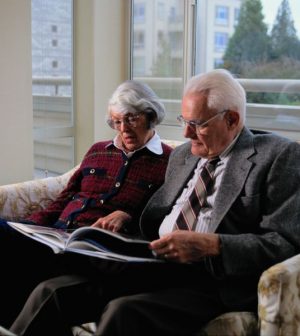- Could Your Grocery Store Meat Be Causing Recurring UTIs?
- Are You Making This Expensive Thermostat Error This Winter?
- Recognizing the Signs of Hypothyroidism
- 10 Strategies to Overcome Insomnia
- Could Artificial Sweeteners Be Aging the Brain Faster?
- Techniques for Soothing Your Nervous System
- Does the Water in Your House Smell Funny? Here’s Why
- Can a Daily Dose of Apple Cider Vinegar Actually Aid Weight Loss?
- 6 Health Beverages That Can Actually Spike Your Blood Sugar
- Treatment Options for Social Anxiety Disorder
Traveling With Dementia: Tips for Family Caregivers

Traveling with a loved one who has dementia requires special preparation. The Alzheimer’s Foundation of America has some advice.
“Traveling is a fun and enjoyable way to reenergize your body and mind. It can be beneficial to people living with dementia and their family caregivers under the proper circumstances,” said Charles Fuschillo Jr., foundation president and CEO.
“Before going on a trip, there are important steps family caregivers should take to ensure that their loved ones will be safe, comfortable and able to make the journey,” he added in a foundation news release.
First you should talk with the person’s doctor to find out if travel is recommended or safe. In the early stages of dementia, travel may still be enjoyable. But it can become overwhelming as dementia progresses, the foundation said.
When deciding how and where to travel, make choices that offer the most comfort and least anxiety. It’s best to stick with the familiar, and visit known destinations that require minimal changes in daily routines, including sleep and eating schedules.
Inform airlines, hotels and/or tour operators that you are traveling with a person who has memory problems. Brief them on safety concerns and special needs. Make sure your loved one has an ID bracelet or clothing tag with his or her full name and yours. Remember to take important health and legal-related documents with you.
If the person with dementia travels better at a specific time of the day, try to plan accordingly. Take breaks along the way for snacks. Allow extra time for rest between activities, or plan for one activity and keep others in mind if you end up with extra time.
The foundation added that if the person with dementia can’t travel, you should consider day trips with enjoyable activities. Another option is a travel theme night. For example, have an Italian-themed night with appropriate food and music, and even an Italian film.
More information
The U.S. National Institute of Neurological Disorders and Stroke has more on dementia.
Source: HealthDay
Copyright © 2026 HealthDay. All rights reserved.










